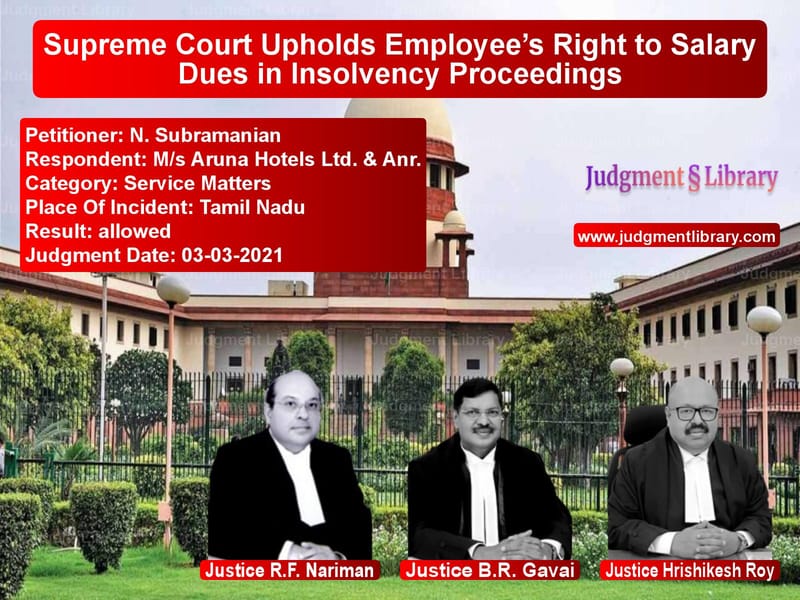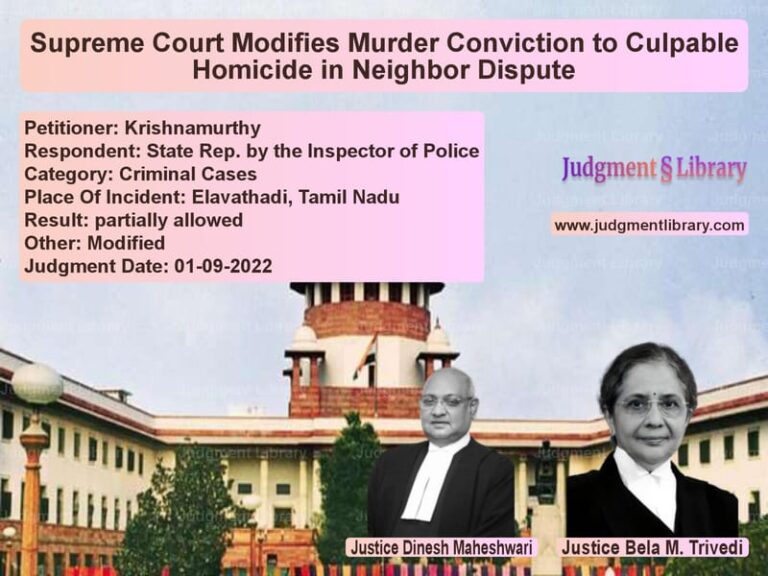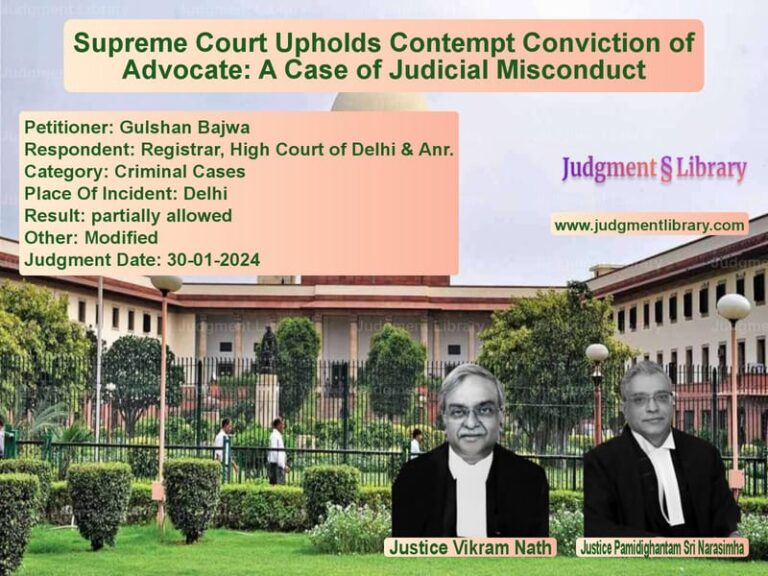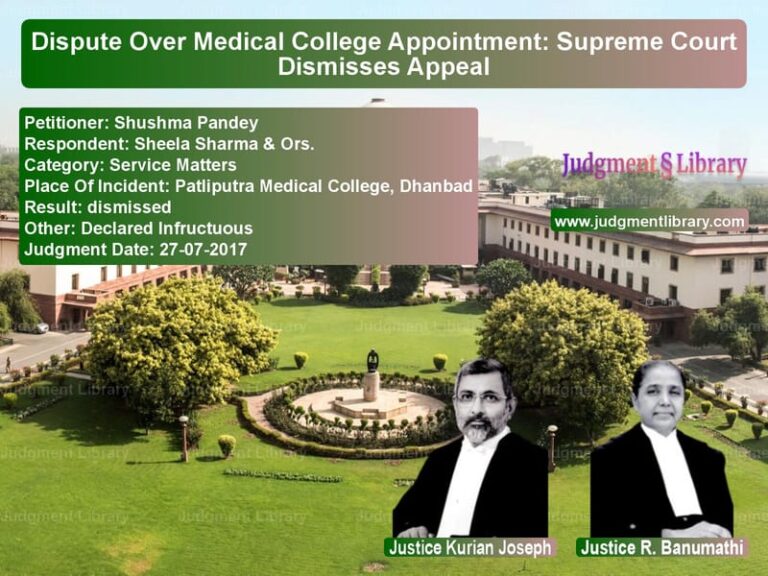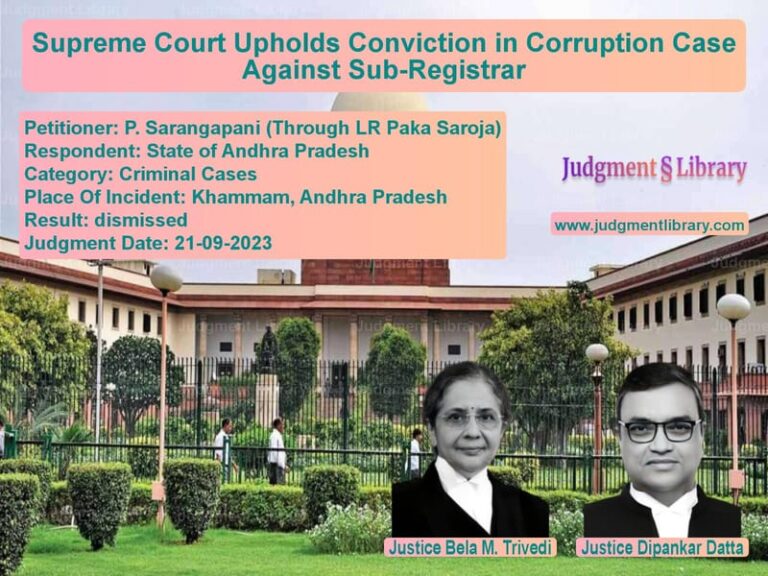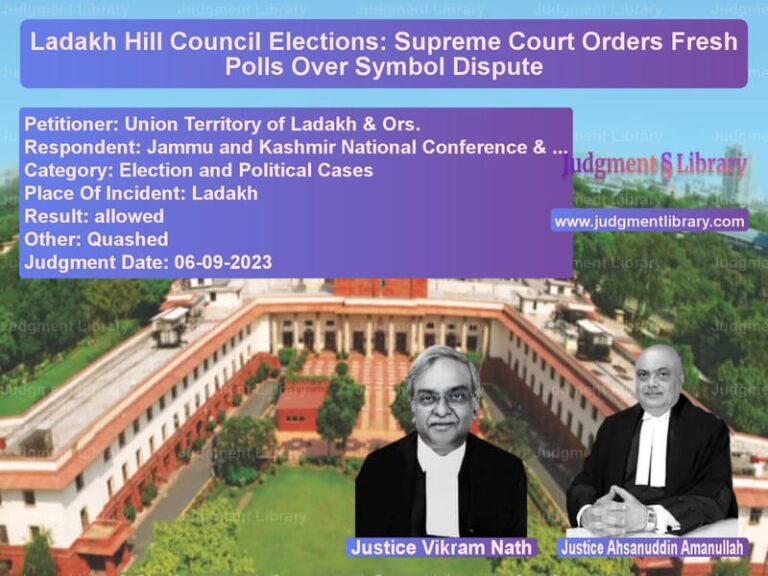Supreme Court Upholds Employee’s Right to Salary Dues in Insolvency Proceedings
The Supreme Court of India, in a significant ruling, upheld the right of an employee to claim outstanding salary dues under the Insolvency and Bankruptcy Code, 2016 (IBC). The judgment in N. Subramanian vs. M/s Aruna Hotels Ltd. & Anr. reaffirmed that salary arrears constitute an operational debt and can be enforced under Section 9 of the IBC.
Background of the Case
The appellant, N. Subramanian, had been an employee of M/s Aruna Hotels Ltd. since 1983 and was promoted to Public Relations Manager. He retired in 2013 and filed an application under Section 9 of the IBC on July 21, 2017, claiming Rs. 1.87 crore in unpaid salary arrears from 1998 to 2013. His claim was based on multiple written acknowledgments of liability issued by the company, with the latest acknowledgment dated September 30, 2014.
However, M/s Aruna Hotels Ltd. denied liability and argued that the claims were time-barred. The case was initially heard by the National Company Law Tribunal (NCLT), which ruled in favor of the appellant and admitted the insolvency petition. The NCLT found that the company had acknowledged the salary dues and that the claim was not time-barred. The matter was then appealed to the National Company Law Appellate Tribunal (NCLAT), which overturned the NCLT’s decision, stating that the claim was beyond the limitation period and there was an ‘existence of dispute’.
Aggrieved by the NCLAT’s decision, the appellant approached the Supreme Court.
Arguments by the Petitioner (N. Subramanian)
- The salary arrears were acknowledged in writing multiple times, with the latest acknowledgment dated September 30, 2014.
- The insolvency petition was filed on July 27, 2017, which was within the three-year limitation period from the last acknowledgment.
- The NCLAT’s finding that the claim was time-barred was erroneous.
- There was no ‘existence of dispute’ as the company had admitted its liability in writing.
- As per the IBC, salary dues qualify as an ‘operational debt’, and the employee qualifies as an ‘operational creditor’.
Arguments by the Respondents (M/s Aruna Hotels Ltd. & Anr.)
- The new management, which took over the company in 2015, was not aware of the alleged salary dues.
- The claim was not reflected in the company’s financial statements or due diligence reports.
- The claim was time-barred, as it related to salary arrears from 1998 to 2013.
- A letter from the Employees Provident Fund Organisation (EPFO) dated April 13, 2016 indicated that the appellant’s claims had been settled.
- Even if the claim was valid, the appellant should have pursued it in a civil court rather than through an insolvency petition.
Supreme Court’s Observations
The Supreme Court analyzed the legal principles governing limitation and the validity of operational debt claims under the IBC.
- Acknowledgment of Liability: The Court held that the acknowledgment of salary dues in writing on September 30, 2014 extended the limitation period by three years, making the insolvency petition filed on July 27, 2017 within the permissible time frame.
- Operational Debt under IBC: The Court reaffirmed that salary dues qualify as an operational debt under the IBC and can be enforced through an insolvency petition.
- Existence of Dispute: The Court found no valid ‘existence of dispute’ since the company had repeatedly acknowledged its liability in writing.
- Irrelevance of EPFO Letter: The Court ruled that the EPFO letter had no bearing on the appellant’s claim for unpaid salary, as it related only to provident fund settlements.
The Court stated:
“At least to the extent of an acknowledgment made by the then Managing Director of the Corporate Debtor, the arrears of salary due for a period of at least three years prior to September 30, 2014, would certainly be within limitation and, therefore, payable to the appellant.”
Supreme Court’s Verdict
- The Supreme Court set aside the NCLAT’s judgment.
- The judgment of the NCLT admitting the insolvency petition was restored.
- The case was remanded to the NCLT for further proceedings under the IBC.
- The Court dismissed the respondents’ contention that the claim was time-barred.
Impact of the Judgment
- Strengthening Employee Rights: The ruling reinforces the rights of employees to claim salary dues under the IBC.
- Clarification on Limitation: The judgment clarifies that written acknowledgments of debt extend the limitation period under the IBC.
- Preventing Corporate Evasion: The ruling prevents companies from evading liability by changing management or financial reporting.
- Encouraging Timely Payments: The judgment serves as a deterrent against non-payment of employee salaries.
Conclusion
The Supreme Court’s decision in N. Subramanian vs. M/s Aruna Hotels Ltd. & Anr. sets a crucial precedent in employment and insolvency law. It upholds the principle that salary dues are enforceable operational debts under the IBC, ensuring that employees have a strong legal mechanism to recover unpaid wages. By reaffirming the validity of debt acknowledgments in extending limitation periods, the judgment protects employees from unjustified corporate defenses against legitimate claims.
Petitioner Name: N. Subramanian.Respondent Name: M/s Aruna Hotels Ltd. & Anr..Judgment By: Justice R.F. Nariman, Justice B.R. Gavai, Justice Hrishikesh Roy.Place Of Incident: Tamil Nadu.Judgment Date: 03-03-2021.
Don’t miss out on the full details! Download the complete judgment in PDF format below and gain valuable insights instantly!
Download Judgment: n.-subramanian-vs-ms-aruna-hotels-ltd-supreme-court-of-india-judgment-dated-03-03-2021.pdf
Directly Download Judgment: Directly download this Judgment
See all petitions in Employment Disputes
See all petitions in Pension and Gratuity
See all petitions in Public Sector Employees
See all petitions in Recruitment Policies
See all petitions in Judgment by Rohinton Fali Nariman
See all petitions in Judgment by B R Gavai
See all petitions in Judgment by Hrishikesh Roy
See all petitions in allowed
See all petitions in supreme court of India judgments March 2021
See all petitions in 2021 judgments
See all posts in Service Matters Category
See all allowed petitions in Service Matters Category
See all Dismissed petitions in Service Matters Category
See all partially allowed petitions in Service Matters Category

